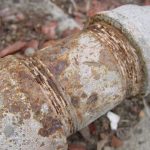The short answer is no, but to elaborate, disposable wipes became available in the late ’70s initially, but it took around 20 years for them to become mainstream. These products were primarily sold alongside diapers and marketed for easy child related cleanup tasks. Today, there are many kinds of disposable wipes, from small pocket packs for handbags and large tubs for the home. Many disposable wipes also contain hand sanitizers, and most of them are labeled as “flushable”. This is not the case; flushing disposable wipes can lead to drain pipe clog that may be expensive to remove. Here are four good reasons why you shouldn’t flush disposable wipes in your toilet.
- Disposable Not Flushable
When these products first came onto the market, they were labeled as disposable. This meant that you were supposed to throw them in the trash when you were finished with them. But, the term “flushable” was added to make them a more convenient option, and many of us have fallen for the hype over the years. During the recent Covid-19 pandemic, we have all learned the value of sanitizing products that are easy to use. But, although a “flushable” wipe is small enough to fit in a drain line, it can become lodged there, and this risk is increased when you use these wipes frequently.
2. Strength is a Weakness
Disposable wipes are designed to be thin and yet very strong to handle a wide variety of cleaning tasks. To reach these specifications, the manufacturers combine natural and synthetic fibers together, including cotton, rayon, polyethylene, polyester, and polypropylene. This material is similar to that found in baby diapers and dryer sheets. But, this material doesn’t break down easily like toilet paper, and the toilet isn’t designed to hand strong materials with these properties.
3. Not a Green Option
If you’re concerned about environmental issues, you may want to avoid using disposable wipes altogether. As you can see above, some of the materials used to make these wipes are plastics that are bad for our environment. They are non-biodegradable, which means they will take a very long time to break down. If you don’t want to contribute to the huge plastic waste problem that we have in the world, it’s a good idea to look for a greener alternative.
4. Waste Attraction
A residential toilet drain line is typically around 4” in diameter, which is adequate for waste and toilet paper. Because a disposable wipe isn’t biodegradable, the water will not simply pass through like it would with toilet paper. So, it’s pretty common to find a wipe lodged in the drain pipe with other waste accumulated around it. Over time these materials will become a solid mass, and no water will be able to pass. Of course, when you flush a toilet, the water has to go somewhere, and that could result in sewer backup into your home.
A clogged drain can occur at any plumbing fixture or drain, and in some cases, you may be able to remove the clog yourself. Avoid using caustic chemical cleaning products because they can damage your pipes. If you have a toilet clog, it’s time to call a local certified plumber to locate the blockage and remove it for you. But, prevention is better than the cure, avoid flushing wipes and schedule some drain cleaning today.
By Giovanni Longo President Flood Brothers Plumbing
Giovanni Longo is a 3rd generation master plumber who has been practicing his craft and trade in the greater Los Angeles area for well over a decade and a half. A plumbing and hydraulics-engineering innovator, Giovanni’s particular world-class expertise focuses on dealing with challenging sewer system designs as well as resolving complex commercial and residential draining issues. As a certified Flood Mitigation expert, he is also well versed in a wide variety of water damage and remediation solution.





